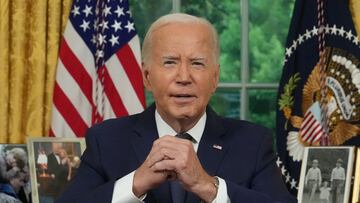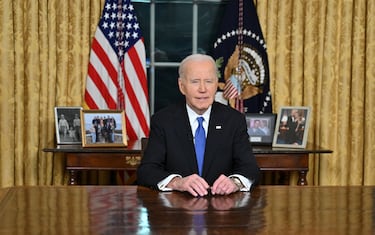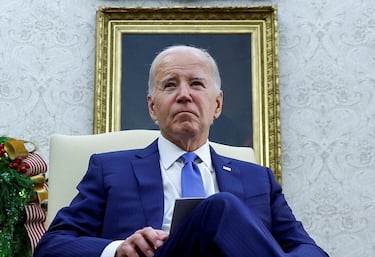Remember this? When Biden reworked the Oval Office post-Trump 45
With Donald Trump returning to the White House on Monday, it’ll be yet another overhaul for the famous room.

When a new President is sworn in there is a whole host of formalities and traditions that are repeated for each new administration. The incomer is sworn in on the steps of the Capitol Building, there is symbolic gift exchange during the congressional luncheon and the predecessor leaves a letter for the new President.
Another important part of the transition process is the redecorating of the Oval Office, the main room where presidential business is conducted and the symbolic centre of power in the White House. While it is rare for there to be any wholesale change the incoming leader can personalise the office as he sees fit, and President Joe Biden’s choices are emblematic of the administration he hopes to lead.
Out with Andrew Jackson, in with Ben Franklin. Biden has already made a physical mark on the Oval by switching out the office’s busts and paintings. “We’re living in a new age, and the oval office shows it,” Michael Beschloss said at the time.
Out with Andrew Jackson, in with Ben Franklin. Biden has already made a physical mark on the Oval by switching out the office's busts and paintings. Says @BeschlossDC, “we’re living in a new age, and the oval office shows it.” #velshi pic.twitter.com/xwm1r2GZRZ
— "Velshi" on MSNBC (@VelshiMSNBC) January 24, 2021
The Washington Post got inside access to the Oval Office back then and shared some fascinating insights into the seat of power in the United States.
Biden’s office represents multicultural America
In his 2017 Inauguration Day speech Biden pledged to be a President “for all Americans, not just those who voted for me”. He was tasked with the job of reuniting a fractured country and therefore wanted his office to reflect all parts of America.
Ashley Williams, the deputy director of Oval Office operations, said of the design: “It was important for President Biden to walk into an Oval that looked like America and started to show the landscape of who he is going to be as president.”
Notable changes from the Trump Oval Office were the introduction of busts of Rev. Martin Luther King Jr. and Robert F. Kennedy, which sat either side of the fireplace. Behind the Resolute Desk were busts of Rosa Parks and Eleanor Roosevelt who were also key figures in the civil rights movement.

Two new paintings were also added with portraits of former president Thomas Jefferson and former treasury secretary Alexander Hamilton sitting side-by-side. The two men famously argued while in office but Biden’s team wanted to illustrate the importance of hearing both sides in a democracy.
New carpet but the curtains remain
While in office the first time around, Trump opted to retrieve the gold curtains that were used during the Clinton administration from storage and had them hung in the Oval Office. Biden decided to keep those curtains rather than return to the rich red that he would have seen while serving as Vice President to the Obama administration.
He did, however, decide to change the iconic oval-shaped rug that fills most of the floor space in the 816-square-foot room. During Trump’s first time in office he had a fairly pale rug that was a similar colour to the cream-coloured sofas in the middle of the room. Biden replaced it with a dark blue carpet which was also used during the Clinton administration.
Furniture and other interior furnishing were kept in a White House collection when not in use so most of the décor seen in that new-look Oval Office were probably used before at some point.

Biden brought his own personal touches to the Oval Office
Within his first week, President Biden had already added a number of personal items to make the highest office in the land feel a bit more homely. On the table in the window, behind Biden’s desk, were a number of photographs of his family.
Visible on the ornate table were framed pictures of the President’s late son, Beau Biden, and his mother, Catherine Eugenia Finnegan. There were also pictures of the First Lady Dr Jill Biden and their three children, alongside other family members, many of whom were present for his inauguration.
Also on that prominent table was a picture of Biden himself, who is a regular church-goer, during a meeting with Pope Francis. In another nod to Biden’s influences there was also a bust of Cesar Chavez, the prominent labour leader and civil rights activist. Chavez is best-known for his efforts to improve working conditions for low-paid farm labourers.
Now it’s Donald Trump’s turn to flip the decor to his liking...
Related stories
Get your game on! Whether you’re into NFL touchdowns, NBA buzzer-beaters, world-class soccer goals, or MLB home runs, our app has it all.
Dive into live coverage, expert insights, breaking news, exclusive videos, and more – plus, stay updated on the latest in current affairs and entertainment. Download now for all-access coverage, right at your fingertips – anytime, anywhere.
Complete your personal details to comment